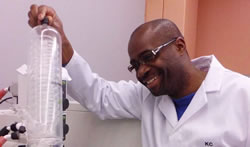Drug Discovery and Development Centre, H3D, identifies a second potent anti-malarial candidate

Adapted from UCT Research and Innovation 27 July 2016
The University of Cape Town (UCT)'s Drug Discovery and Development Centre, H3D, has identified a new potent anti-malarial development candidate with potential for both treatment and prevention of malaria. The compound, referred to as UCT943, is the second preclinical candidate to come out of the collaboration led by H3D involving the Switzerland-based Medicines for Malaria Venture (MMV) and an international network of partners. The data so far shows that UCT943 has potent activity against all stages of the malaria parasite life-cycle and has the potential to block transmission of the parasite from person to person. This will all be the focus of the next studies, and will ultimately need to be validated in humans.
H3D is Africa's first integrated drug discovery and development centre, led by Professor Kelly Chibale of the Department of Chemistry and member of the IDM. When H3D was first launched in 2010, it was a team of five academic postdoctoral research scientists. Now, H3D has grown to a team of over fifty, attracting industry-experienced drug discoverers from pharmaceutical companies based in India, the USA and Europe. It is also helping to train a new generation of African scientists, creating strong foundations for the future. This transformation has allowed the transfer of key skills and technology to South Africa: from medicinal chemistry to biology and pharmacokinetics. The H3D portfolio also includes projects targeting tuberculosis drug discovery and is now expanding to address the serious threat of Antimicrobial Resistance, specifically resistant Gram negative bacteria.
For the full article see:
www.research.uct.ac.za/uct%E2%80%99s-drug-discovery-and-development-centre-h3d-identifies-second-potent-anti-malarial-candidate
